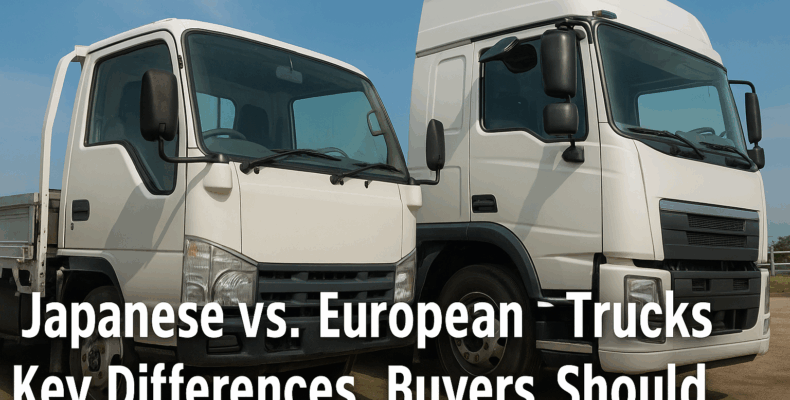When choosing a used truck for business, global buyers often compare Japanese and European models. Both have strong reputations, but they serve different needs depending on region, budget, and purpose.
This article breaks down the real-world differences between Japanese and European trucks so you can make an informed decision. Whether you operate in Africa, the Caribbean, the Middle East, or Southeast Asia, this guide will help you choose wisely.
Let’s explore the features that matter most to international buyers.
1. Affordability and Initial Cost
Japanese used trucks generally cost less upfront than their European counterparts. Japanese auction systems, export competition, and high domestic turnover create a surplus of high-quality trucks at reasonable prices.
European trucks, on the other hand, often come with higher initial price tags due to advanced specs and stronger currency values.
🔹 Winner for Budget Buyers: Japanese Trucks
2. Fuel Efficiency
Fuel economy is a major concern for global users, especially where fuel prices are high. Japanese trucks are well-known for their excellent fuel efficiency, especially in models like the Toyota Dyna, Isuzu Elf, and Mitsubishi Canter.
Although European trucks (such as Mercedes-Benz or Volvo) also have efficient engines, they are usually larger and heavier, which leads to more fuel consumption in small-business or local delivery settings.
🔹 Best for Daily Fuel Savings: Japanese Trucks
3. Durability and Build Quality
European trucks are often praised for their robust build and premium parts. Brands like Scania, MAN, and Iveco design trucks to last under heavy usage and long-distance travel. They often use stronger frames and offer superior suspension systems.
Japanese trucks focus more on light-to-medium-duty use and urban delivery. Still, they are surprisingly tough and require less frequent repairs if maintained properly.
🔹 For Heavy Hauling: European Trucks
🔹 For Urban or Farm Work: Japanese Trucks
4. Ease of Maintenance & Spare Parts
Japanese trucks have a major edge here. Because Japanese brands dominate markets across Asia, Africa, and the Caribbean, spare parts are widely available and more affordable.
European truck parts, while high in quality, are often expensive and harder to source, especially in rural regions or developing nations.
🔹 Best for Maintenance Cost: Japanese Trucks
5. Technology and Features
If you want high-tech features like advanced driver assistance systems (ADAS), digital dashboards, or integrated telematics, European trucks usually win.
Japanese trucks are more basic but practical. Their controls are straightforward, and there are fewer electronic systems that can fail. For many global users, this simplicity is a plus.
🔹 Best for High-Tech: European Trucks
🔹 Best for Simple Operation: Japanese Trucks
6. Size and Maneuverability
Japanese trucks come in compact sizes perfect for narrow roads, tight parking spaces, and small farms. Kei trucks and light-duty models are highly favored in regions with limited space or weak infrastructure.
European trucks are designed for large-scale freight, often operating in wide highways and cross-border routes across Europe.
🔹 Best for Tight Environments: Japanese Trucks
🔹 Best for Long Hauls: European Trucks
7. Resale Value
Japanese trucks generally maintain high resale value in global markets due to their durability, trusted brands, and easy parts availability.
European trucks may have strong resale potential in regions with established support networks. But in less developed areas, buyers hesitate due to maintenance costs.
🔹 Best for Long-Term Investment: Japanese Trucks
Conclusion: Which Truck Should You Choose?
If you need a truck that’s:
-
Affordable
-
Fuel-efficient
-
Easy to maintain
-
Compact and reliable
Then a Japanese used truck is your best bet.
However, if your business requires:
-
High-tech features
-
Heavy-duty hauling
-
Luxury comfort
Then consider a European truck, but be prepared for higher costs.
No matter your choice, working with a reliable exporter is key. Transparency, accurate documentation, and good after-sales support can make all the difference.
👉 Explore this trusted list to start your buying journey:
Top 5 Trusted Japanese Used Truck Exporters for Global Buyers
